(完整word版)小学英语时态汇总
(最新版)小学英语语法八大时态总结
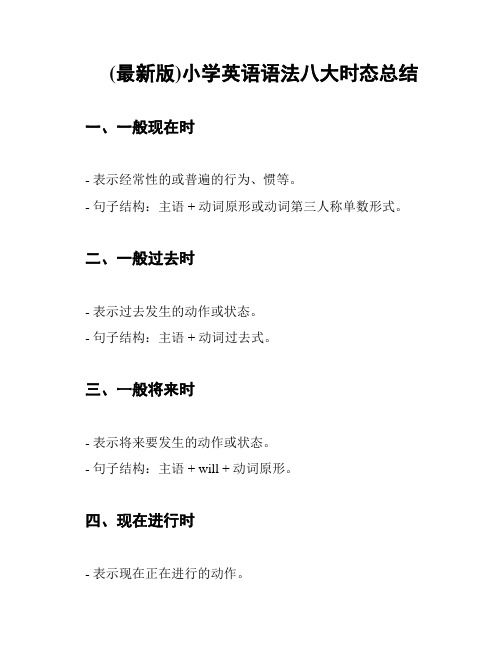
(最新版)小学英语语法八大时态总结一、一般现在时
- 表示经常性的或普遍的行为、惯等。
- 句子结构:主语 + 动词原形或动词第三人称单数形式。
二、一般过去时
- 表示过去发生的动作或状态。
- 句子结构:主语 + 动词过去式。
三、一般将来时
- 表示将来要发生的动作或状态。
- 句子结构:主语 + will + 动词原形。
四、现在进行时
- 表示现在正在进行的动作。
- 句子结构:主语 + am/is/are + 动词-ing。
五、过去进行时
- 表示过去某个时间正在进行的动作。
- 句子结构:主语 + was/were + 动词-ing。
六、将来进行时
- 表示将来某个时间正在进行的动作。
- 句子结构:主语 + will be + 动词-ing。
七、现在完成时
- 表示过去发生但与现在有关的动作或经历。
- 句子结构:主语 + have/has + 动词过去分词。
八、过去完成时
- 表示过去某个时间之前已经发生的动作。
- 句子结构:主语 + had + 动词过去分词。
以上是小学英语语法八大时态的总结,希望能对同学们的研究有所帮助。
(word版)小学英语语法时态讲解与归纳,文档

小学英语语法时态讲解与归纳—一般现在时一、一般现在时:1.表示事物或人物的特征、状态。
如:Theskyisblue.天空是蓝色的。
2.表示经常性或习惯性的动作。
如:Igetupatsixeveryday我.每天六点起床。
3.表示客观现实。
如:Theearthgoesaroundthesun地.球绕着太阳转。
二.构成及变化动词的变化。
肯定句:主语否认句:主语一般疑问句:+be(am,is,are)+ 其它。
如:Iamaboy. 我是一个男孩。
+be+not+ 其它。
如:Heisnotaworker. 他不是工人。
Be+主语+其它。
如:-Areyouastudent? -Yes.Iam./No,I'mnot.特殊疑问句:疑问词+一般疑问句。
如:Whereismybike?2. 行为动词的变化。
l、当主语为第一,二人称及复数时,助动词为do肯定句:主语+动词原形(+其它)。
如:Weoftenplaybasketballafter否认句:主语+don't+动词原形(+其它)。
如:wedon’tplaybasketballschool.after school.一般疑问句:Do+主语+动词原形+其它?如:Doyouoften playbasketballafterwedon't.schooll?Yes,wedo./No,特殊疑问句:疑问词+以do开头的一般疑问句?如:Whatdoyouoftendoafterschool?3、当主语为第三人称单数时,助动词为does肯定句:主语+动词三单式(+其它)。
如:Heswimswell.否认句:主语+doesn’t+动词原形(+其它)。
如:Hedoesn’tswimwell..一般疑问句:Does+主语+动词原形+其它。
如:Doesheswimwell?(1)Yes,hedoes./No,hedoesn't.(2)特殊疑问句:疑问词+以does开头的一般疑问句?(3)如:Howdoesyourfathergotowork?(4)(5)(6)三.第三人称单数的动词变化规那么〔只有在第三人称为主语的肯定句中,动词才用三单式〕(7)多数动词直接加s:runsgetslikescolletstakesplaysclimbs.(2)结尾是s,x,sh,ch,o,前为辅音字母,结尾加es:watchesteachesgoesdoeswashescrossesmixesbrushes(3)动词末尾y前为辅音:将y改为i加es:study →studiesfly→flies carry→carriescry→cries但在y前如果为元音那么直接加s: buys saysplaysstays(4) 不规那么变化常见的:have----has四.时间标志:always,usually,often,sometimes,every一般现在时练习题〔1〕一、写出以下动词的第三人称单数drink ________ go _______ stay________ make ________look _________ have_______ pass_______carry ____come________ watch______ plant_______ fly________study_______ brush________ do_________teach______二.用以下单词的适当形式填空often___________(play)intheplayground._________(get)upatsixo ’clock._________(brush)yourteetheverymorning?4.What________________(do)heusually________________(do) after school?________________(study)English, Chinese,maths,scienceandArt atschool.sometimes__________(go)totheparkwithhissister.eight,she__________(watch)TVwithherparents.Mike________(read)Englisheveryday?manylessons_________yourclassmates________(have)onMonday?time_________hismother_________(do)thehousework?三.改句子youoftenplayfootballafterschool?( 改为肯定句)havesomebooks. 〔改为否认句〕Shan’ssisterlikesplayingtable tennis 〔改为否认句〕livesinasmalltownnearNewYork. 〔改为一般疑问句〕watchTVeveryday. 〔改为一般疑问句〕havefourlessons. 〔改为否认句〕doesn’trunfast〔改为肯定句〕dogrunsfast.否认句:一般疑问句:hastwolettersforhim.一般疑问句:否认句:usuallyplayfootballonFridayafternoon. 否认句:一般疑问句:划线提问YangusuallywashessomeclothesonSaturday. 否认句:一般疑问句:划线提问: usuallywaterstheflowerseveryday.否认句:一般疑问句:doeshishomeworkathome.否认句:一般疑问句:一般现在时练习题〔2〕一、用所给动词的正确形式填空like____________(swim)._________(read)English everyd ay._________(go)toschoolatseveninthemorning.4.Mike________(go)toschoolatseveninthemorning .mother________(like)______(go)shoppi ng.can________(draw)many beautifulpictures.7.She_________(make)amodelplane.you________(like)_________(run)?he_________(like)_________(jump)?Nancy_________(grow)flowersonSaturday?teachers________(like)___________(dance).teacher________(like)____________(dance).students___________(speak)Englishinclass.student_________(speak)Chineseafterclass.Let’s____________andplayfootball.(go)He_____________likeswimming.(not)I’msorry____________that.(hear)WangBingis____________(write)anE-mailtohisfriend._________youstudyEnglishatschool?Yes,I___________.(do)20.__________yoursister studyEnglish atschool?No,she__________. (do)I’m_________better.(feel)Why__________Tomabsenttoday?(be)二、用所给的人称改写句子takephotosonSunday.(Mike)growbeautifulflowers.(she) likecollectingstamps.(Ben) listentomusiccarefully.(myaunt) likemakingamodelship.(Helen) cleantheclassroomeveryday.(he) lookafterthepandas.(MrWang) drawatreeandsomeflowers.(Nancy)gotobedateight.(mysister)readnewspapersintheevening.(MrGreen)人称代词与物主代词一、人称代词单数复数人称主格宾格主格宾格第一人称I me we us第二人称you you you youhe him第三人称she her they them it it二、物主代词数单数复数人称第一第二第三第一第二第三类别人称人称人称人称人称人称形容词性物主my your his her itsour your their代词名词性物主代(word版)小学英语语法时态讲解与归纳,文档11 / 1111mine yours his hersits ours yourstheirs词我们你们他〔她、汉语我的你的他的她的它的的的它〕们的。
(完整word版)小学英语时态汇总

小学英语 4 大时态(一般此刻时、一般过去时、一般未来时,此刻进行时)汇总表格时态定及用法一①常性或性的作;般②在刻的状、能力、性格或个状①always, usually, often,sometimes, hardly, ever,never;②every second / hour构◆一定句:◆否认句:1.主 +be(am, is, are) +⋯ 1.主 +be(am, is, are) +not+2.主 +(原形 /三 )+ ⋯ 2.主+don ’ t/doesn ’ t+原形例肯 I am a student.⋯否 I am not a student.+⋯疑Are you a student?现性等;③客真谛、客在存在或科学事;④格言或许名言时警语;一① 去常生的作;般②去存在的状;③ 去某个特定过生的作或存在的状;去④ 去生的一系列作;时/day / year / Friday/ June;③once a week, twicetwo weeks;①yesterday, yesterdaymorning/afternoon ⋯ .the day before yesterday,②before, the yearbefore last year,③in 1845/in the 1840s④last year/month/weekterm/Sunday/summer⑤just now; the otherday⑥段 +ago; longlong ago◆一般疑句:1.be(am, is, are)+主 +⋯肯回: Yes, 主 + be(am, is, are).否回: No, 主+am not/isn ’t/aren◆一定句:1.主 +be(was/were)+⋯2.主 +的去式 +⋯◆一般疑句:1.be(was/were)+ 主+⋯肯回: Yes, 主 + be(was/were).否回: No, 主+wasn’t/weren ’t.2.Do/Does+ 主+原形 +⋯肯回: Yes, 主 +do/does.’否t.回: No, 主 +don’t/doesn◆否认句:1.主 +be(was/were)+not+2.主 +didn ’ t+原形 +⋯2.Did+ 主 +原形 +⋯肯回: Yes, 主+did.否回: No, 主 +didn ’t.肯They get up early.否They don't get up early.疑Do they get up early?’t.肯He helps us.否He doesn't help us疑Does he help us?特别疑句:How often do you exercise?肯He was a student two years ago⋯否 He wasn't a student two years.疑Was he a student two years ago?肯They came back last night否They didn't come back last night.疑Did they come back last night?特别疑句:1.How was your school trip?2.When was he born?时态一般将来时在行定及用法一般未来主要表示:①将要生的作;②将要存在的状;③划、打当作某事;1.will/shall+ 原形shall 只用于第一人称 (I/we) ,常被 will 所取代; will 在述句顶用于各人称,在征求意常用于第二人称。
(完整版)小学英语时态总结
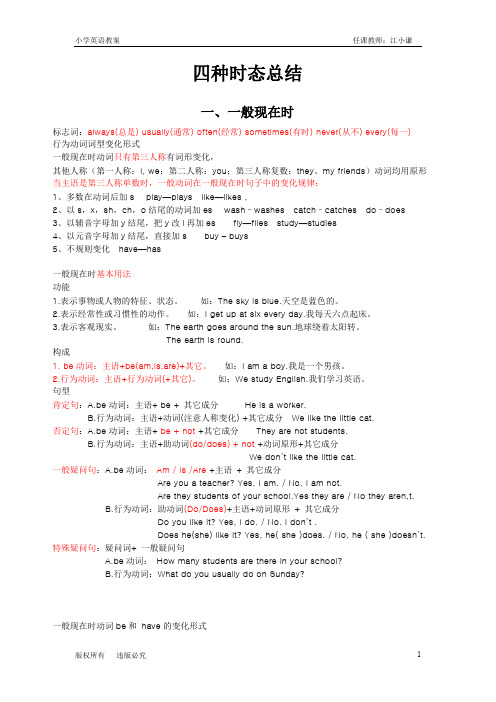
四种时态总结一、一般现在时标志词:always(总是) usually(通常) often(经常) sometimes(有时) never(从不) every(每一)行为动词词型变化形式一般现在时动词只有第三人称有词形变化,其他人称(第一人称:I, we;第二人称:you;第三人称复数:they、my friends)动词均用原形当主语是第三人称单数时,一般动词在一般现在时句子中的变化规律:1、多数在动词后加s play—plays like—likes ,2、以s,x,sh,ch,o结尾的动词加es wash–washes catch–catches do–does3、以辅音字母加y结尾,把y改i再加es fly—flies study—studies4、以元音字母加y结尾,直接加s buy – buys5、不规则变化have—has一般现在时基本用法功能1.表示事物或人物的特征、状态。
如:The sky is blue.天空是蓝色的。
2.表示经常性或习惯性的动作。
如:I get up at six every day.我每天六点起床。
3.表示客观现实。
如:The earth goes around the sun.地球绕着太阳转。
The earth is round.构成1. be动词:主语+be(am,is,are)+其它。
如:I am a boy.我是一个男孩。
2.行为动词:主语+行为动词(+其它)。
如:We study English.我们学习英语。
句型肯定句:A.be动词:主语+ be + 其它成分He is a worker.B.行为动词:主语+动词(注意人称变化) +其它成分We like the little cat.否定句:A.be动词:主语+ be + not +其它成分They are not students.B.行为动词:主语+助动词(do/does) + not +动词原形+其它成分We don’t like the little cat.一般疑问句:A.be动词:Am / Is /Are +主语+ 其它成分Are you a teacher? Yes, I am. / No, I am not.Are they students of your school.Yes they are / No they aren,t.B.行为动词:助动词(Do/Does)+主语+动词原形+ 其它成分Do you like it? Yes, I do. / No. I don’t . Does he(she) like it? Yes, he( she )does. / No, he ( she )doesn’t.特殊疑问句:疑问词+ 一般疑问句A.be动词:How many students are there in your school?B.行为动词:What do you usually do on Sunday?一般现在时动词be和have的变化形式1.动词Be 叫连系动词, 用法:第一人称单数用am,第三人称单数用is,其它人称用are。
完整版)小学英语时态总结
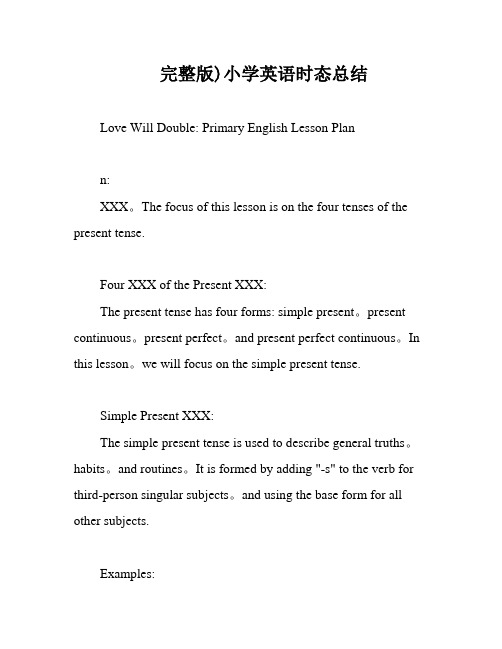
完整版)小学英语时态总结Love Will Double: Primary English Lesson Plann:XXX。
The focus of this lesson is on the four tenses of the present tense.Four XXX of the Present XXX:The present tense has four forms: simple present。
present continuous。
present perfect。
and present perfect continuous。
In this lesson。
we will focus on the simple present tense.Simple Present XXX:The simple present tense is used to describe general truths。
habits。
and routines。
It is formed by adding "-s" to the verb for third-person singular subjects。
and using the base form for all other subjects.Examples:1.XXX.2.We usually eat breakfast at 7am.3.They sometimes go to the park on weekends.Usage:1.XXX.2.To describe habits or routines.3.XXX.Structure:1.For "be" verbs: subject + be + adjective/noun XXX: XXX.2.For n verbs: subject + verb (+ object)XXX: XXX.Negative Form:1.For "be" verbs: subject + be + not + adjective/noun XXX: She is not tired.2.For n verbs: subject + do/does + not + verb (+ object) XXX: We do not like spicy food.n Form:1.For "be" verbs: Be + subject + adjective/nounXXX: XXX?2.For n verbs: Do/Does + subject + verb (+ object)XXX: Do they speak Chinese?n:By the end of this lesson。
(完整版)小学英语语法时态讲解与归纳(参考)
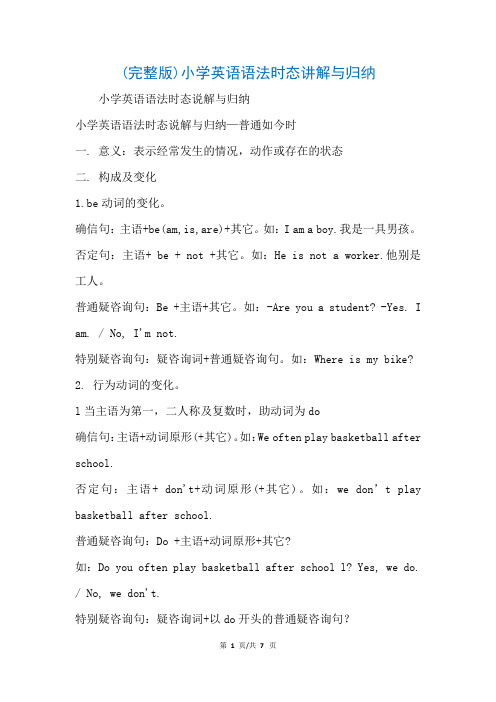
(完整版)小学英语语法时态讲解与归纳小学英语语法时态说解与归纳小学英语语法时态说解与归纳—普通如今时一. 意义:表示经常发生的情况,动作或存在的状态二. 构成及变化1.be动词的变化。
确信句:主语+be(am,is,are)+其它。
如:I am a boy.我是一具男孩。
否定句:主语+ be + not +其它。
如:He is not a worker.他别是工人。
普通疑咨询句:Be +主语+其它。
如:-Are you a student? -Yes. I am. / No, I'm not.特别疑咨询句:疑咨询词+普通疑咨询句。
如:Where is my bike?2. 行为动词的变化。
l当主语为第一,二人称及复数时,助动词为do确信句:主语+动词原形(+其它)。
如:We often play basketball after school.否定句:主语+ don't+动词原形(+其它)。
如:we don’t play basketball after school.普通疑咨询句:Do +主语+动词原形+其它?如:Do you often play basketball after school l? Yes, we do. / No, we don't.特别疑咨询句:疑咨询词+以do开头的普通疑咨询句?如:What do you often do after school ?l当主语为第三人称单数时,助动词为does确信句:主语+动词三单式(+其它)。
如:He swims well.否定句:主语+ doesn’t+动词原形(+其它)。
如:He doesn’t swim well..普通疑咨询句:Does +主语+动词原形+其它。
如:Does he swim well ?Yes, he does. / No, he doesn't.特别疑咨询句:疑咨询词+以does开头的普通疑咨询句?如:How does your father go to work?三.第三人称单数的动词变化规则(惟独在第三人称为主语的确信句中,动词才用三单式)(1)多数动词直截了当加s:Runs gets likes collets takes plays climbs…….(2)结尾是s, x, sh, ch, o,前为辅音字母,结尾加es :Watches teaches goes does washes crosses mixes brushes (3)动词末尾y前为辅音:将y改为i加es: study→studies fly→fliescarry→carries cry→cries但在y前假如为元音则直截了当加s: buys says四.时刻标志:always , usually , often , sometime s ,every…如今举行时一.意义——当表示如今正在举行的动作或正在发生的事。
(完整版)小学英语语法_四大时态(可编辑修改word版)
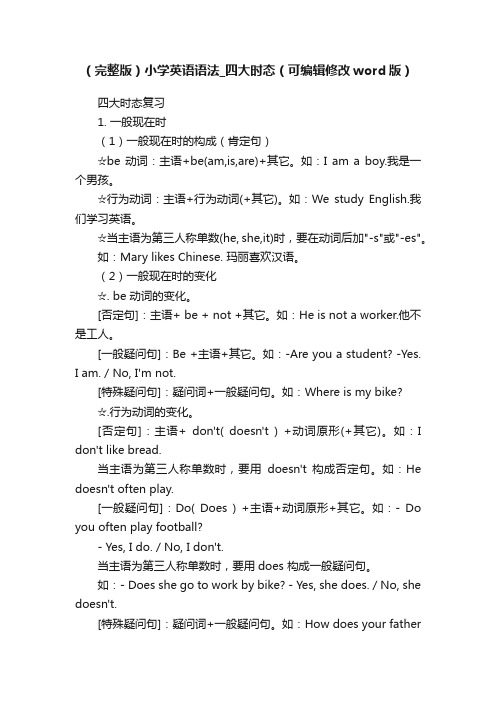
(完整版)小学英语语法_四大时态(可编辑修改word版)四大时态复习1. 一般现在时(1)一般现在时的构成(肯定句)☆be 动词:主语+be(am,is,are)+其它。
如:I am a boy.我是一个男孩。
☆行为动词:主语+行为动词(+其它)。
如:We study English.我们学习英语。
☆当主语为第三人称单数(he, she,it)时,要在动词后加"-s"或"-es"。
如:Mary likes Chinese. 玛丽喜欢汉语。
(2)一般现在时的变化☆. be 动词的变化。
[否定句]:主语+ be + not +其它。
如:He is not a worker.他不是工人。
[一般疑问句]:Be +主语+其它。
如:-Are you a student? -Yes.I am. / No, I'm not.[特殊疑问句]:疑问词+一般疑问句。
如:Where is my bike?☆.行为动词的变化。
[否定句]:主语+ don't( doesn't ) +动词原形(+其它)。
如:I don't like bread.当主语为第三人称单数时,要用doesn't 构成否定句。
如:He doesn't often play.[一般疑问句]:Do( Does ) +主语+动词原形+其它。
如:- Do you often play football?- Yes, I do. / No, I don't.当主语为第三人称单数时,要用does 构成一般疑问句。
如:- Does she go to work by bike? - Yes, she does. / No, she doesn't.[特殊疑问句]:疑问词+一般疑问句。
如:How does your fathergo to work?*动词+s 的变化规则1.一般情况下,直接加-s,如:cook-cooks, milk-milks2.以s. x. sh. ch. o 结尾,加-es,如:guess-guesses, wash-washes, watch-watches, go-goes3.以“辅音字母+y”结尾,变y 为i, 再加-es,如:study-studies2. 现在进行时(1)一般现在时的构成:be(am,is, are)+ 动词的ing 形式。
英语中的十六种时态(可编辑修改word版)
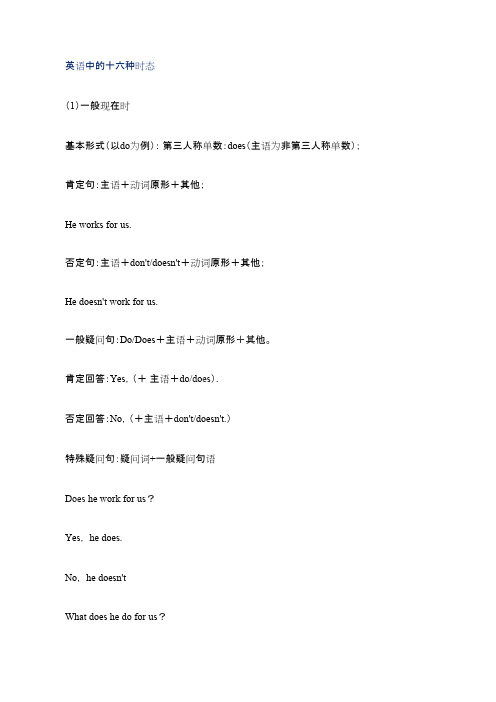
英语中的十六种时态(1)一般现在时基本形式(以do为例):第三人称单数:does(主语为非第三人称单数);肯定句:主语+动词原形+其他;He works for us.否定句:主语+don't/doesn't+动词原形+其他;He doesn't work for us.一般疑问句:Do/Does+主语+动词原形+其他。
肯定回答:Yes,(+主语+do/does).否定回答:No,(+主语+don't/doesn't.)特殊疑问句:疑问词+一般疑问句语Does he work for us?Yes, he does.No, he doesn'tWhat does he do for us?He works for us.(2)一般过去时be动词+行为动词的过去式否定句式:在行为动词前加didn't,同时还原行为动词,或was/were+not;was或were放于句首;用助动词do的过去式did提问,同时还原行为动词例如: Did he work for us?He didn't work for us.He worked for us.(3)一般将来时am/are/is+going to+do 或will/shall+doam/is/are/about to + doam/is/are to + do;一般将来时的表达方法be going to +动词原形be +不定式,be to+动词原形,be about to +动词原形be able to +不定式be about to+动词原形will + 动词原形;例如:He is going to work for us.He will work for us;He is coming.这是特殊的用一般现在时表达将来时态的例子!!(4)过去将来时be(was,were)going to+动词原形be(was,were)about to+动词原形be(was,were)to+动词原形肯定句:主语+be(was,were)going to+动词原形~.否定句:主语+be(was,were)not going to+动词原形~.疑问句:Be(Was,Were)+主语+going to+动词原形~?肯定句:主语+would(should)+动词原形~.否定句:主语+would(should)not+动词原形~.疑问句:Would(Should)+主语+动词原形~?He would work for us.(5)现在进行时主语+be+v.ing〔现在分词〕形式(其中v表示动词)表示现在正在进行的动作或最近在做的事。
- 1、下载文档前请自行甄别文档内容的完整性,平台不提供额外的编辑、内容补充、找答案等附加服务。
- 2、"仅部分预览"的文档,不可在线预览部分如存在完整性等问题,可反馈申请退款(可完整预览的文档不适用该条件!)。
- 3、如文档侵犯您的权益,请联系客服反馈,我们会尽快为您处理(人工客服工作时间:9:00-18:30)。
疑Was he a student two years ago?
肯They came back last night
否They didn't come back last night.
疑Did they come back last night?
2.主+动词的过去式+…2.主+didn’t+动词原形+…
◆一般疑问句:
1.be(was/were)+主+…2.Did+主+动词原形+…
肯回:Yes,主+ be(was/were).肯回:Yes,主+did.
否回:No,主+wasn’t/weren’t.否回:No,主+didn’t.
肯He was a student two years ago
◆一般疑问句:
1.be(am, is, are)+主+…2.Do/Does+主+动词原形+…
肯回:Yes,主+ be(am, is, are).肯回:Yes,主+do/does.
否回:No,主+am not/isn’t/aren’t.否回:No,主+don’t/doesn’t.
肯I am a student.
肯He is going to work
否He isn't going to work.
疑Is he going to work?
肯You will work
否You will not work.
疑Will you work?
特殊疑问句:
-What are you doing for vacation.
②everysecond / hour /day / year / Friday/ June;
③once a week, twice two weeks;
◆肯定句:◆否定句:
1.主+be(am, is, are) +…1.主+be(am, is, are) +not+…
2.主+动词(原形/三单)+…2.主+don’t/doesn’t+动词原形+…
否I am not a student.
疑Are you a student?
肯They get up early.
否They don't get up early.
疑Do they get up early?
肯He helps us.
否He doesn't help us
疑Does he help us?
特殊疑问句:
1.How was your school trip?
2.When was he born?
时态
定义及用法
Байду номын сангаас时间状语
结构
举例
一
般
将
来
时
一般将来时主要表示:
1将要发生的动作;
2将要存在的状态;
3计划、打算做某事;
1.will/shall+动词原形
shall只用于第一人称(I/we),常被will所代替;will在陈述句中用于各人称,在征求意见时常用于第二人称。
2before,the year before last year,
3in1845/in the 1840s
4lastyear/month/week
term/Sunday/summer
5just now; the other day
6时间段+ago; long long ago
◆肯定句:◆否定句:
1.主+be(was/were)+…1.主+be(was/were)+not+…
2.be going to +动词原形
1)主语的意图,即:将做某事。例:
2)计划,安排要发生的事。例:
3)有迹象要发生的事(天气)。例:
3.有些词用“现在进行时”表示按计划即将发生的动作,如:
【go,come,start,move,sail,leave,arrive,stay】等。
1tomorrow,
----I’m going camping.
现在进行时
现在进行时主要表示:
1.表示现在(指说话人说话时)正在发生的事情;
2.表示长期的或者重复性的动作,目前阶段正在进行,而说话时动作未必正在进行;
3.表示渐变的动词:get, grow, become, turn, run, go, begin等;
now,right now,
the dayaftertomorrow,
the year after next year, tomorrowmorning/afternoon/evening
2nextweek/year/term/
summer vacation/Friday
3from now on;
in the future;
in 2050;
2.be going to
◆肯定句:
主+be(am/is/are) +动词原形+…
◆否定句:
主+be(am/is/are)+ not+动词原形+…
◆一般疑问句:
Be(Am/Is/Are)+主+动词原形+…?
肯回:Yes,主+ be(am/is/are).
否回:No,主+am not/isn’t/aren’t.
4in +时间段(重点)
1.will / shall
◆肯定句:
主+will/shall+动词原形+…
◆否定句:
主+will/shall + not+动词原形+…
◆一般疑问句:
Will/Shall +主+动词原形+…?
肯回:Yes,主+will/shall.
否回:No,主+ won’t/shan’t.
小学英语4大时态(一般现在时、一般过去时、一般将来时,现在进行时)汇总表格
时态
定义及用法
时间状语
结构
举例
一
般
现
在
时
1经常性或习惯性的动作;
2现在时刻的状态、能力、性格或个性等;
3客观真理、客观存在或科学事实;
4格言或者名言警句;
①always, usually, often, sometimes, hardly, ever, never;
特殊疑问句:
How often do you exercise?
一
般
过
去
时
1过去经常发生的动作;
2过去存在的状态;
3过去某个特定时间发生的动作或存在的状态;
4过去连续发生的一系列动作;
1yesterday,yesterday morning/afternoon….
the day before yesterday,
at present
at the moment,
at this time,
these days;
【暗示语】
Look!(放句首)
